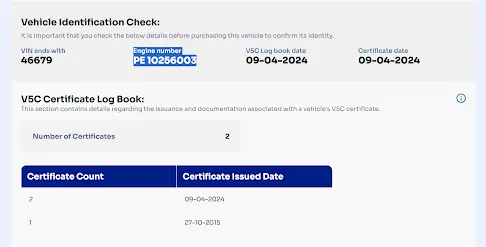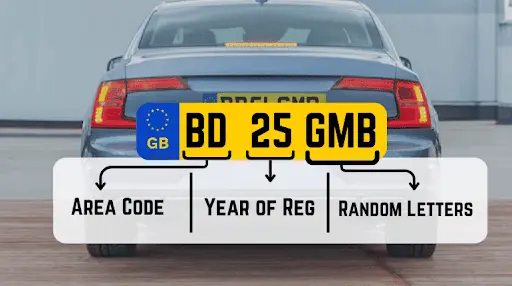- Lowest price check
- Great Customers Review
- Fast and Accurate
- Lowest price check
- Great Customers Review
- Fast and Accurate
Engine Number Check
Buying a used car in the UK? Don’t risk hidden problems. Our engine number check instantly verifies the true identity of a vehicle’s engine, protecting you from fraud, stolen parts, or costly mistakes.
What is an Engine Number Check?
An engine number check will help you confirm whether the engine of a car is legitimate, matches its records, and is in compliance with the law. Each car has its own engine number, similar to a fingerprint, and an engine check will help see whether the engine has been replaced, stolen, or modified.
Before purchasing a used car, it is important to check the engine number of the vehicle to help reveal any concealed issues, falsified identities, or substituted engines that may lead to future legal complications. A vehicle engine number check online keeps you safe before and after buying.
Why Do You Need an Engine Number Check?
An engine number check protects you from costly risks and ensures you’re buying a legal, safe vehicle. Here’s why every car buyer should check before purchase.
Detect Stolen Vehicles
Criminals often swap or hide engines in stolen cars. An engine number check reveals if the engine has been flagged as stolen, saving you from legal issues or car seizure.
Confirm Vehicle Authenticity
The engine number must match the logbook (V5C) and DVLA records. If it doesn’t, it could mean illegal modifications or a replacement engine not declared to insurers.
Avoid Hidden Repairs
A mismatched engine number may signal serious past damage, where the original engine was replaced. Knowing this protects you from buying a car with an unreliable or unsafe repair history.
Prevent Finance or Insurance Issues
If the engine doesn’t match official records, finance companies or insurers can reject claims. An engine number check ensures your car’s details are legitimate and insurable.
Spot Clocked or Fake Cars
Engine swaps are sometimes used to disguise high-mileage cars or even create “cloned” vehicles. A check confirms the engine’s true history, avoiding fraud.
Protect Your Investment
A car with an incorrect or suspicious engine number loses value instantly. Checking upfront guarantees you’re paying the right price for a genuine vehicle.
What is Included in Our Engine Number Check Report?
Our engine number check reveals the correct engine number, and everything you need to confirm a car’s true identity, ensuring it matches DVLA records and is safe to buy.
It helps identify:
- Stolen engines
- Mismatched VIN and engine details
- Undeclared engine swaps
- Previous major repairs
- Insurance and MOT discrepancies
- Risk of cloned cars

The engine number check also provides details about important and hidden records that aren’t always visible or need to be verified. It includes the following:
Vehicle Specifications
Confirms the original details such as year, make, engine size, model, trim, and fuel type. Sellers sometimes misrepresent cars with swapped engines or false claims. This record makes sure the car matches its official factory specifications.
Outstanding Finance
This shows if the vehicle has unpaid loans or finance agreements still attached. If so, the lender could legally repossess it, leaving you out of pocket. Checking this record ensures the car is truly debt-free before purchase.
Stolen Vehicle Records
Confirms whether the car or its engine has ever been reported stolen in the UK. Buying a stolen vehicle means the police can seize it without compensation. This record safeguards your money and peace of mind.
Insurance Write-Off Records
Reveals if the vehicle has been declared a total loss due to severe accident damage, flooding, or fire. Even if repaired, such cars may have reduced safety and value. This record helps you avoid unsafe investments.
MOT History
Provides a detailed timeline of every MOT test the car has undergone, including advisories, passes, and failures. By checking this, buyers can spot repeated engine-related issues and determine how well the car has been maintained over time.
Logbook History
Verifies the V5C logbook details, ensuring that the engine number matches official DVLA records. A mismatch can indicate tampering or fraud. This record ensures ownership and documentation are consistent and legally sound.
High-Risk Records
Check whether the vehicle is associated with serious risks such as being imported, exported, scrapped, or involved in organised crime. These vehicles can be seized, refused registration, or cost a fortune in legal troubles.
Ownership Records
Shows the number of previous owners and any gaps in ownership. This is vital for tracing the car’s history, identifying patterns of frequent sales, and spotting possible reasons for quick resales.
How to Check Engine Number?
Running an engine number check is simple and fast. Just follow these steps:
Step 1: Enter the Reg or VIN Number
Enter the vehicle registration into the form on this page or run a VIN check.
Step 2: Click “Search”
Click on the “Search” button to initiate the search and view some vehicle details like the specs, colour, etc.
Step 3: View Engine Number Check Report
You will get a complete car check report with details of the engine number and specifications, and other records like MOT and tax status, outstanding finance, insurance write-off status and category, MOT history, and more.
Where is the Reg Number Location?
Your registration number (number plate) is usually found at the front and rear of the car. You’ll also find it in the V5C logbook, insurance documents, and MOT records.
In the UK, number plates follow a set colour scheme: the front plate features black characters on a white background, while the rear plate uses black characters on yellow.

Get a Full Car History Check
Beyond checking the engine number and details, our full car check helps verify outstanding finance, write-offs, theft, mileage, and more. Protect yourself fully by getting the complete vehicle history report.
FAQ about Engine Number Check
How to Find out Car Engine Details?
You can find engine details in the owner’s manual, on the logbook (V5C), insurance papers, or directly on the engine block. You can also use the car registration or VIN to run a vehicle engine number check online to confirm if these details are correct.
Can my VIN Number tell me what engine I have?
Yes, the 17-character VIN provides key vehicle specifications, including the engine type and specs. With an engine number check, you can confirm if the actual engine matches the VIN number and hasn’t been swapped or tampered with.
Does MOT Check Engine Number?
Yes, an MOT test verifies if the engine number is valid and corresponds with the registration documents. It helps check if the vehicle meets safety and environmental standards, ensuring its roadworthiness.
Where can I get my engine number?
You will find the engine number stamped on the engine block, near the gearbox, or on a metal plate under the bonnet. The number may also be located on your V5C logbook, service records, or owner’s manual.
How do I know what year my engine is?
To determine the engine year of your car, find the engine serial number or data code on the engine block and visit the website of the car manufacturer to decode the number. The engine date code is added after the initial two numbers in the serial number. An example is when an engine is manufactured in 2013, you would see 3013622. The “13” indicates the year 2013.
What is the difference between an engine number and an engine code?
The engine number is a unique serial number, like a fingerprint. It helps track the production and verify originality. The engine code contains both letters and numbers, and identifies the engine’s type, capacity, and performance. This is crucial when selecting parts or replacing your car’s engine.
Can engine codes help identify the suitability of a car for specific needs?
Yes, engine codes help reveal details like engine size, power, and fuel type, helping buyers know whether the car suits their driving expectations, towing, or performance requirements.
How can I verify the engine number and engine codes of a used car?
To verify a car’s engine number and codes, check the V5C logbook and owner’s documents. You can physically check the engine block and the VIN sticker to ensure the numbers match. For a complete check, run an engine number check online to reveal the engine details based on the VIN number.
Why are engine numbers and engine codes important to buying a used car?
Engine numbers and codes help confirm identity, specifications, legality, and performance details. They are also used to validate insurance and maintain warranty. Mismatched numbers can signal theft, fraud, or major repairs, issues that affect value, safety, and your ability to insure the car.
Can a mismatch engine number and engine codes indicate a problem?
Yes. A mismatch suggests engine replacement, tampering, or fraud. It can also cause insurance issues, reduce resale value, and leave you with an unreliable or unsafe car.
How are engine codes used in vehicle recalls?
Manufacturers use engine codes to recall which vehicles have potential engine issues or faults. The code helps them link to a particular production batch and send recall updates to the owners of the affected vehicles. A full car check helps ensure you know whether your engine is part of a safety recall campaign.
How can I find the engine number and engine codes on my vehicle?
Look under the bonnet, on the engine block, near the gearbox, or on the V5C logbook. An online engine number check can also confirm details quickly.
What should I do if the engine number or codes on my vehicle do not match the documents?
If a car’s engine number doesn’t match your V5C logbook, contact the Driver and Vehicle Licensing Agency (DVLA) to update the records by providing evidence of the changes.. A failure to do so is against the law and may indicate theft, fraud, or undeclared modifications that make the vehicle unsafe or illegal.

